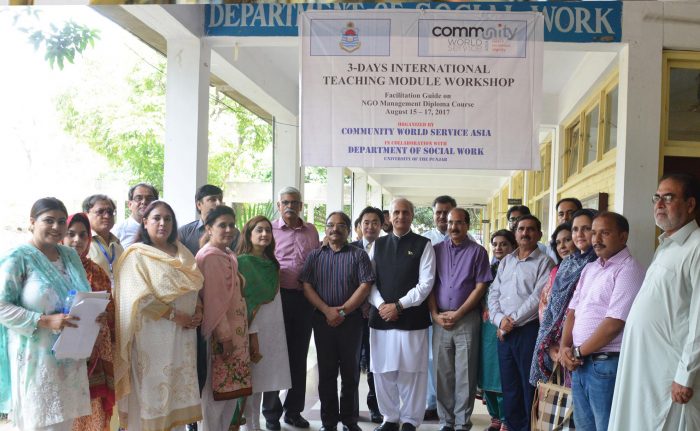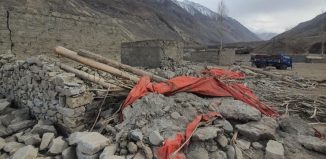Collaborating on Strengthening the capacity of present and future NGO practitioners in Pakistan
As part of developing the syllabus for the Post-Graduate diploma in NGO Management, faculty from universities and colleges of Punjab, Peshawar and Sindh (Jamshoro) along with representatives from the provincial social welfare department and Community World Service Asia staff came together for a three-day consultative workshop in Lahore this August. The key objective of the workshop was to discuss and agree on the main contents of the teaching guideline for each of the modules taught under the NGO management course and develop clear action plans for the course.
The interactive and discussion filled workshop facilitated by Takeshi Komino, Deputy Director and Disaster Risk Reduction (DRR) Expert, Community World Service Asia, had a participation of twenty academia practitioners, fifteen women and five men. These included University Professors, Assistant Professors, Lecturers and college teachers, from across Pakistan.
To support universities in teaching about humanitarian and development practices (based on field work) and empower them on tools and approaches used by development professionals, Community World Service Asia succeeded in developing partnership with two Universities i.e., University of Peshawar and University of the Punjab. Both of these universities are among the oldest institutions in Pakistan. In both the universities, the Department of Social Work has been assessed to being very similar to the work of the aid and development sector.
Community World Service Asia then initiated the process of supporting both institutions in designing this new post-graduate diploma course through a six step process leading to the launch of the degree. Peshawar University already launched the degree in February this year and received an overwhelming application response from graduate students and some NGO practitioners. While, University of Punjab aims to start offering the course in December this year and University of Sindh plans to initiate it sometime in their 2018 semesters.
This workshop is part of the technical and consultative support that Community World Service Asia is providing to the academia in assuring that the degree fully meets its objective of familiarizing students with the fundamental concepts of NGO management and its project implementations, its role in bringing about social change through explaining the various dimensions in which it works. The next step in this process is to conduct a Training of Trainers on “Creative Facilitation Skills” to further strengthen the capacity of faculty members teaching the various course modules. This is planned to be held in Peshawar University this October.
Academia Insights:
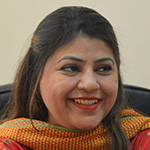 Sonia Omar, Assistant Professor, Social Work Department, Punjab University
Sonia Omar, Assistant Professor, Social Work Department, Punjab University“This course is really a need of the hour as far as the significance of this degree is concerned, considering the situation in Pakistan. We are a developing country; we cannot always rely on the government alone. Therefore, we have to support and encourage NGOs and the university and academia needs to take a step ahead. We must add specific development and aid practice related programs to our departments and courses. These will help future practitioners and those who are already in the field. It will also help those who want to establish NGOs to serve the people of the country.
This three-day workshop really helped in building the right curriculum for the NGO management course. We are expecting that the drafted curriculum will be further refined. We at Punjab University really intend to start the degree within 6 months. I am sure we will be getting a great response from the students.
Community World Service Asia has been very facilitative through our collaboration. When so many think tanks from NGO sector, academia and social welfare departments working together always ends in very positive outcomes.”
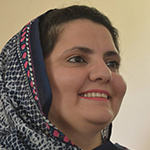 Sumera Farid, Teacher of Introduction to NGOs Module, Social Sciences Department, Peshawar University”
Sumera Farid, Teacher of Introduction to NGOs Module, Social Sciences Department, Peshawar University”As teachers, this course has been very interactive with a lot of participation from students. For students, this course has been very interesting and new. They have all been very enthusiastic, sometimes critical and very active in discussions. It has been more of a two-way learning process for us. With teaching this course, we really felt like we’re contributing a lot in the learning process of students and youth. The exposure visits and special lectures that we have included as part of the modules acts as developing linkages for these students and helps to set a foundation for future professional careers for students. We organised a visit to the Drug Addiction Centres and lectures from representatives of Social Welfare Departments as part of the first semester. Admissions for fall semester have also been announced for new students for this degree and we are expecting many applications.”
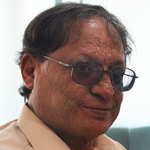 Bashir Khan, Deputy Director, Social Welfare Department (KPK) & Visiting Faculty at Peshawar University.
Bashir Khan, Deputy Director, Social Welfare Department (KPK) & Visiting Faculty at Peshawar University.“I am teaching the students of this Diploma course on social legislation policies in regards to the non-profit sector. Most of the students in the course have social sciences background, and only few who are actually NGO practitioners, so this is a great learning opportunity for them. This is mostly new information for them and many students have joined this course with a hope to be employed in the private social/development sector with knowledge of this additional information. Today, we are here at this workshop to review the course modules and revise and design the course to best fit the understanding level and requirements of students.”
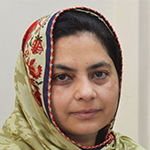 Farhana Noreen, Human Rights Teacher, Social Sciences Department, Peshawar University.
Farhana Noreen, Human Rights Teacher, Social Sciences Department, Peshawar University.“I am teaching the Human Rights modules to students in this degree. We received more applications from new under-grad students for this diploma course. Therefore, we have started the modules and subjects from the very basic level. The teachers for this course have been given 30% flexibility on teaching methodologies which is great. Students are very enthusiastic to learn as they are eager to join the NGO sector. As part of the course, we organised exposure visits of students to the Ministry of Human Rights as practical learning. This aspect of learning has been very effective and of great interest to students.
As one of the inputs for this workshop, we do feel that some of the modules of the course need reshuffling in terms of where to be taught in the semester timelines for it to be more effective.”
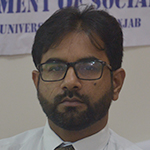 Mohammad Arshad Abbasi, Assistant Professor, Social Work Department, Punjab University
Mohammad Arshad Abbasi, Assistant Professor, Social Work Department, Punjab University“NGO management and leadership is a new concept in Pakistan. A large number of organizations are working in the NGO sector but very few of them have the expertise skills and are academically qualified to work on social issues and in the humanitarian/development sector. This diploma has been designed to equip our students with the skills, knowledge and expertise on how to work with NGOs, specially on enhancing skills on developing project proposals, fund-raising and on human rights issues and the various laws and policies related to NGOs. I hope that our students will get maximum benefits through this diploma. Furthermore, this diploma program will assist in developing expert and trained human resources that will ultimately play an important role in the NGO sector and in improving the sector. The consultation by Community World Service Asia and their technical and financial assistance has played a key role in developing the curriculum of this degree program. And time to time, training and exposure opportunities provided by them have helped us a lot in refining and finalizing the course contents and to get it approved by the concerned authorities.”
 Waheed Akbar, Lecturer, Social Work Department, University of Sindh in Jamshoro.
Waheed Akbar, Lecturer, Social Work Department, University of Sindh in Jamshoro. “As far as my department and our university is concerned, this is a very helpful course for the future of our students, given that they will get this sort of professional knowledge through all the modules included in this one-year diploma. I think this will be a milestone in our department and as well as for students of social work in this area. During this course and after completion, students will be equipped with specialized knowledge and skills and their capacities will be enhanced. Our university will be creating resources for the development and humanitarian sector of our province. The NGO management diploma is also offered to professionals who are already working in the field, though many of them don’t have the exact NGO academic qualification. Therefore, this will be an added platform and capacity building opportunity in the form of a certified degree for them.
This consultative workshop gave us a chance to share and learn a lot of knowledge from faculties from universities from Peshawar and Punjab. Through this workshop, we aimed to polish and develop the syllabus, we discussed new ideas and possibilities. We also realized that there are some specific and technical areas in the course, for example social entrepreneurship or financial management etc., that we as faculty need to build our own capacity in as well to teach the students. For this we seek opportunities to enhance and build our own competencies to make this degree a sure success.”





